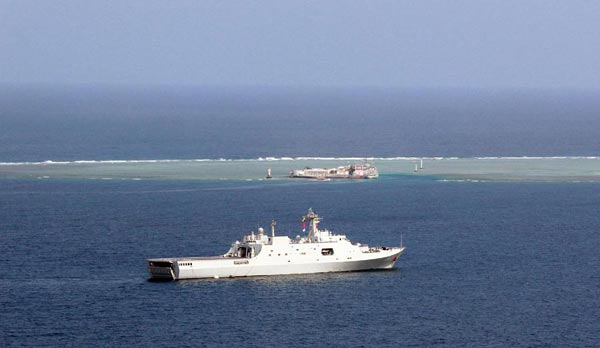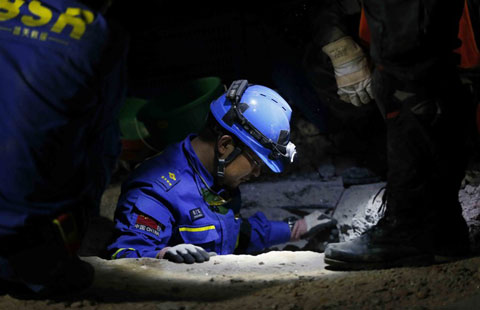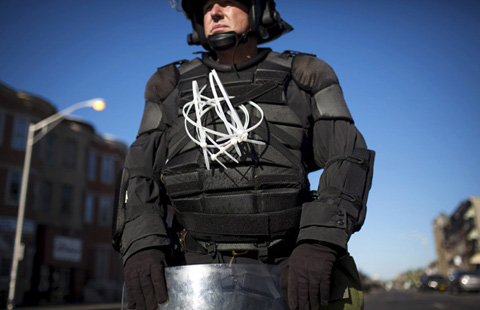Code of conduct key to South China Sea
Updated: 2015-04-30 07:44
(China Daily)
|
||||||||
 |
|
A formation of the Nanhai Fleet of China's Navy on Saturday finished a three-day patrol of the Nansha islands in the South China Sea. [Photo/Xinhua] |
China was justified in expressing its serious concern and indignation on Tuesday over the Chairman's Statement at the 26th ASEAN Summit which said, "we share the serious concerns expressed by some leaders on the land reclamation being undertaken in the South China Sea".
China's construction and maintenance works on some islands and reefs in the Nansha Islands fall within its sovereignty. The works are to improve the working and living conditions of its personnel stationed on those islands.
There is no problem with overflights or freedom of navigation in the South China Sea.
Countries, particularly, the Philippines are obviously behind ASEAN's finger-pointing at China. Since tensions over the maritime disputes flared up, it has been a routine trick in recent years for Manila to try to take ASEAN hostage and impose its own hidden agenda on the 10-member bloc.
ASEAN, as the most influential multilateral platform in the region, should stick to a neutral and impartial stance in the maritime territorial disputes. After all, the disputes only exist between a few ASEAN members and China, as such, they should be resolved bilaterally by the parties concerned. The regional bloc should bear in mind that it has a consensus with China on this principle .
Since the 1970s, the Philippines has illegally seized some islands and islets from China in the South China Sea. In recent years, it has harassed Chinese fishermen in waters off Huangyan Island while stirring up anti-China sentiments at home.
ASEAN should be told that the price of allowing an obvious troublemaker in the South China Sea to take it hostage could be costly, as any attempt to breach the bilateral formula would not only complicate the situation but also increase the risk of interference by outside forces.
The ASEAN statement also reaffirmed "the importance of maintaining peace, stability, security and freedom of navigation in and overflights over the South China Sea." It urged intensified consultations to ensure the expeditious establishment of an effective code of conduct for the South China Sea.
This is the right approach to handling the tensions in these waters. The bloc should oppose any words and deeds that are intended to break the boundaries of these principles.
China and ASEAN have held rounds of negotiations on a code of conduct since 2013. The only sensible choice for all parties concerned is to create the necessary conditions and atmosphere for reaching a code of conduct at an early date.
- Tourists swarm Mount Taishan even before holiday
- Hospitals checked for possible bribes, kickbacks, misconduct
- 2,000 Chinese tourists return from Nepal
- Watchdog says Sinopec chief faces investigation
- Red Cross Society of China delivers relief supplies to Nepal
- 4,000 Chinese stranded in quake-hit Nepal

 'Comfort women' survivor attends protest of Jpapan PM
'Comfort women' survivor attends protest of Jpapan PM
 Ten photos you don't wanna miss – April 29
Ten photos you don't wanna miss – April 29
 China's rescue team searches for survivors in Nepal
China's rescue team searches for survivors in Nepal
 Police descend on Baltimore to enforce curfew after riots
Police descend on Baltimore to enforce curfew after riots
 Top 10 Chinese cities with innovative flair
Top 10 Chinese cities with innovative flair
 Tourists swarm Mount Taishan even before holiday
Tourists swarm Mount Taishan even before holiday
 Man pulled alive from rubble 82 hours after quake
Man pulled alive from rubble 82 hours after quake
 Baltimore erupts in riots after funeral of man who died in police custody
Baltimore erupts in riots after funeral of man who died in police custody
Most Viewed
Editor's Picks

|

|

|

|

|

|
Today's Top News
US rapped for stance on Japan
Obama, Abe talk much about China
Japan PM protested at US Capitol, San Francisco
Chinese students caught in riot scene
China hits out as Abe visits the US
Riot-hit Baltimore, an American city divided by income and opportunity
Record shattered as Furious 7 sets hot pace
'Rent-a-Foreigner' business by China's real estate developers
US Weekly

|

|






